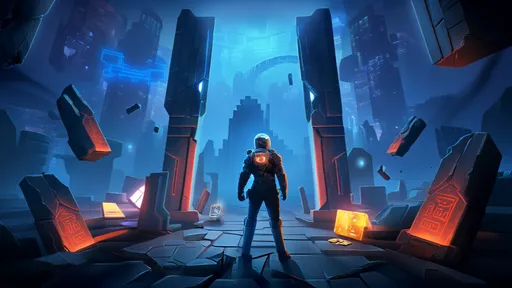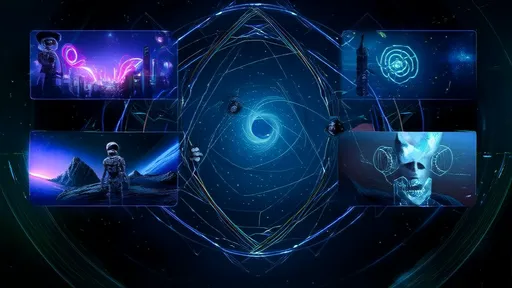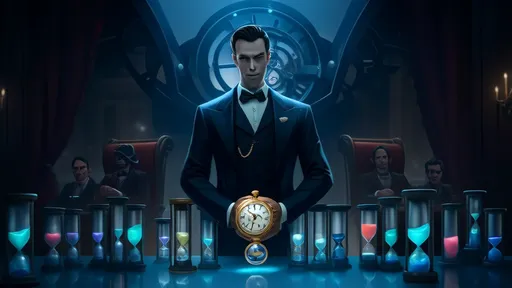In the sprawling digital landscapes of Azeroth, where orcs clash with humans and mythical beasts roam pixelated plains, an unexpected group of researchers has taken up residence. Cultural anthropologists, armed with notepads and voice recording software rather than swords and spells, have begun embedding themselves within World of Warcraft guilds to study these complex social structures. What began as an academic curiosity has blossomed into a legitimate field of study, revealing surprising truths about how humans organize themselves in virtual worlds.
The phenomenon gained traction in the late 2000s when several anthropology PhD candidates realized that massively multiplayer online games offered perfect controlled environments for studying group dynamics. Unlike traditional field work in physical communities, game worlds provide built-in observation tools, clear membership boundaries, and detailed records of interactions. Dr. Eleanor Whitman of UC Irvine famously spent eighteen months with the guild Forgotten Heroes, documenting their rituals, power structures, and conflict resolution methods. Her groundbreaking paper "Blood Pact: Tribal Identity in Digital Spaces" challenged conventional notions of what constitutes a "real" community.
These researcher-players employ classic ethnographic methods adapted for digital environments. They participate in raids and guild chats while maintaining detailed field notes. Some record voice communications (with permission), analyzing tone and conversational patterns. The most dedicated create alternate characters to observe how different roles (healer versus damage dealer, for instance) affect social standing. What emerges are rich portraits of societies with their own laws, traditions, and even creation myths - the latter often revolving around a guild's founding or legendary victories.
One fascinating discovery concerns leadership structures. Many successful guilds develop hybrid models blending meritocracy with temporary authoritarianism. During raids, commanders assume near-dictatorial control, demanding perfect obedience to strategy. Yet outside these high-stakes events, decision-making often becomes strikingly democratic, with officers elected and major policies put to vote. This fluid switching between hierarchy and equality fascinates researchers studying organizational behavior.
Language itself transforms in these environments. Anthropologists document the emergence of unique dialects blending gaming terminology with guild-specific inside jokes. The Azure Vanguard guild studied by Cambridge researchers developed an entire vocabulary of portmanteau words, while Dwarven Vow famously communicates primarily through reinterpreted lines from fantasy films. These linguistic innovations serve as social glue, creating barriers to entry that reinforce group identity.
Perhaps most surprisingly, these virtual communities exhibit many hallmarks of traditional cultures. They create origin stories, observe rituals (like weekly "drunk raids"), and develop complex systems of honor. When the guild Moonlight Sentinels dissolved after six years, members organized a three-day funeral procession across multiple game zones - complete with eulogies and symbolic destruction of gear. Such behaviors mirror death rites observed in small-scale societies worldwide.
The research hasn't been without controversy. Some gamers resent what they see as academic intrusion, comparing anthropologists to "cultural tourists." A infamous incident occurred when a researcher from the guild Shadowborn published unflattering findings about their loot distribution practices, leading to online harassment. Most scholars now emphasize transparency, clearly identifying their research goals and often sharing findings with the communities they study.
As virtual worlds grow more sophisticated, so too does this field of study. Recent projects examine how guilds handle real-world issues like mental health struggles among members, or how political ideologies manifest in game governance structures. Some anthropologists speculate that insights from these digital cultures may help improve collaboration in physical workplaces or online communities.
What began as niche research has gained academic legitimacy, with papers now published in major anthropology journals. Universities are establishing dedicated programs for digital ethnography, and at least three tenure-track positions now focus specifically on virtual world cultures. The data is simply too rich to ignore - these guilds represent living laboratories of human social behavior, unfettered by geographical constraints.
For the anthropologists who've spent years immersed in these pixelated societies, the implications extend far beyond gaming. Their work challenges fundamental assumptions about what makes a community "real." When guildmates who've never met physically will drive across states to attend a fellow member's wedding, or organize real-world fundraisers for medical bills, the line between virtual and physical relationships blurs. In documenting these phenomena, researchers aren't just studying Azeroth - they're charting new frontiers of human connection.
The next phase of research may explore how these digital cultures evolve as gaming technology advances. With virtual reality platforms allowing more embodied interactions, and blockchain systems enabling player-owned economies, the social dynamics grow ever more complex. One thing remains certain: wherever humans congregate, whether around ancient campfires or digital raid tables, anthropologists will be there to document the fascinating cultures that emerge.

By /Jul 3, 2025

By /Jul 3, 2025

By /Jul 3, 2025

By /Jul 3, 2025

By /Jul 3, 2025

By /Jul 3, 2025

By /Jul 3, 2025

By /Jul 3, 2025

By /Jul 3, 2025

By /Jul 3, 2025

By /Jul 3, 2025

By /Jul 3, 2025

By /Jul 3, 2025

By /Jul 3, 2025

By /Jul 3, 2025

By /Jul 3, 2025

By /Jul 3, 2025

By /Jul 3, 2025